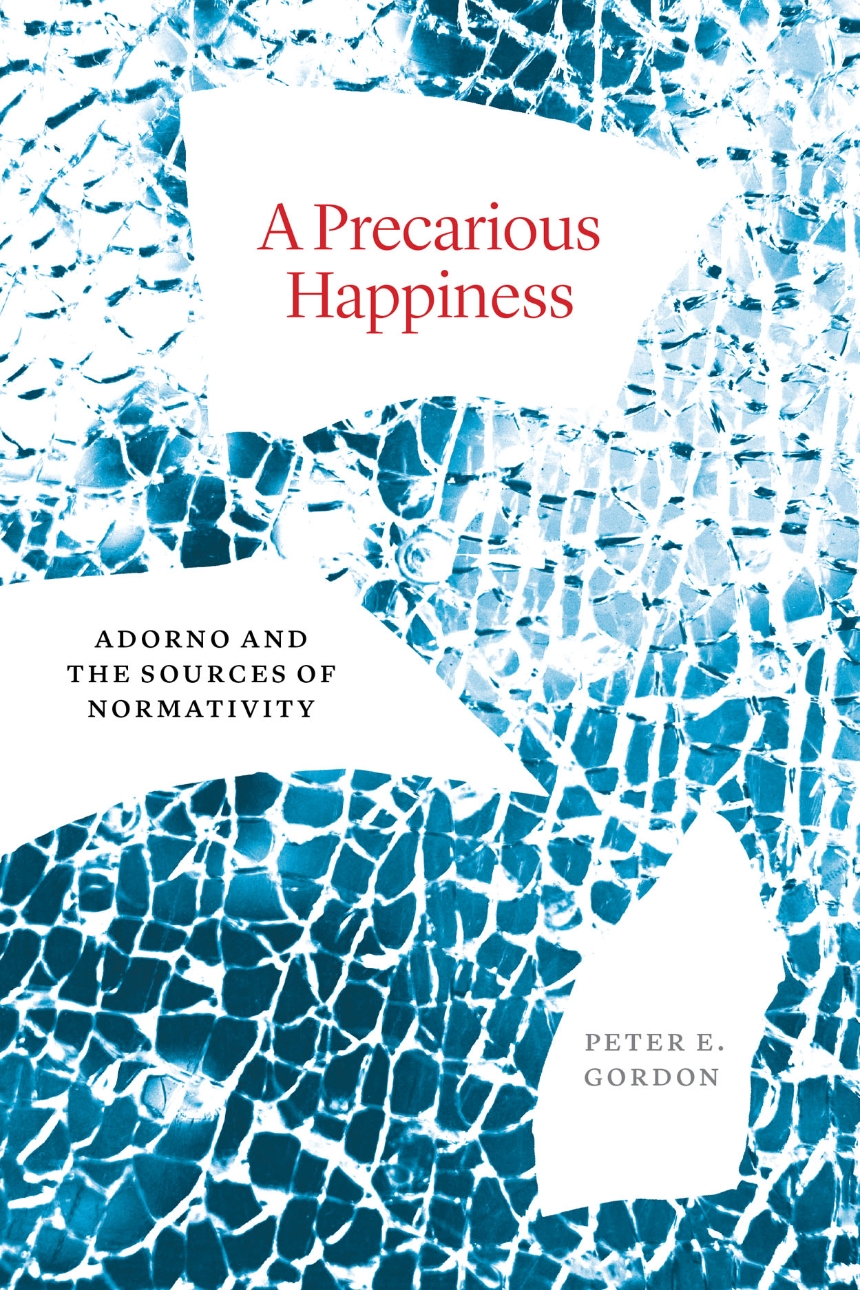A Precarious Happiness
Adorno and the Sources of Normativity
A strikingly original account of Theodor Adorno’s work as a critique animated by happiness.
"Gordon’s confidently gripping and persistently subtle interpretation brings a new tone to the debate about Adorno’s negativism."—Jürgen Habermas
Theodor Adorno is often portrayed as a totalizing negativist, a scowling contrarian who looked upon modern society with despair. Peter E. Gordon thinks we have this wrong: if Adorno is uncompromising in his critique, it is because he sees in modernity an unfulfilled possibility of human flourishing. In a damaged world, Gordon argues, all happiness is likewise damaged but not wholly absent. Through a comprehensive rereading of Adorno’s work, A Precarious Happiness recovers Adorno’s commitment to traces of happiness—fragments of the good amid the bad. Ultimately, Gordon argues that social criticism, while exposing falsehoods, must also cast a vision for an unrealized better world.
"Gordon’s confidently gripping and persistently subtle interpretation brings a new tone to the debate about Adorno’s negativism."—Jürgen Habermas
Theodor Adorno is often portrayed as a totalizing negativist, a scowling contrarian who looked upon modern society with despair. Peter E. Gordon thinks we have this wrong: if Adorno is uncompromising in his critique, it is because he sees in modernity an unfulfilled possibility of human flourishing. In a damaged world, Gordon argues, all happiness is likewise damaged but not wholly absent. Through a comprehensive rereading of Adorno’s work, A Precarious Happiness recovers Adorno’s commitment to traces of happiness—fragments of the good amid the bad. Ultimately, Gordon argues that social criticism, while exposing falsehoods, must also cast a vision for an unrealized better world.
320 pages | 4 line drawings | 6 x 9 | © 2023
History: History of Ideas
Philosophy: Aesthetics, Ethics, General Philosophy, Philosophy of Society
Reviews
Table of Contents
Preface to the English Edition: Adorno’s Legacy
Introduction: Against Gnosticism
The Negativist Interpretation
Performative Contradiction
Honneth and Recognition
Living Less Wrongly
Social Uniformity
The Challenge of Self-Reflexivity
Presuppositions of Public Criticism
The Possibility of Immanent Critique
The Question of Exaggeration
Marx’s Critical Method
The Idea of Normative Surplus
Aesthetics and Normative Surplus
The Stakes of Social Criticism
Temporality and Normativity
Concluding Remarks
1 Immanent Critique
Beethoven’s Fidelio
The Micrological Glance
The Non-Identical
Non-Identity and Critique
Rehearsals of the Right Life
Immanent and Transcendent Critique
Immanent Transcendence
2 Human Flourishing
The Emphatic Concept of the Human Being
Dialectical Contradiction
The Normative Status of Emphatic Concepts
Normativity and Damage
Nietzsche, Genealogy, Validity
Happiness and Human Flourishing
Happiness and the Limits of Formalism
3 Materialism and Nature
The Critical Appropriation of Marxian Themes
The Priority of the Object
The Turn to Experience
Openness and Vulnerability
The Nature in Human Nature
Three Illustrations
Concluding Remarks
4 From Metaphysics to Morality
Need and Desire
Mimesis and Materialism
Metaphysical Experience
A Materialist Morality
The Postulate of the Highest Good
Happiness and Suffering
5 Aesthetic Theory
The Persistence of the Aura
The Sign of Freedom
The Analogy to Play
Art and Suffering
Autonomy and Heteronomy
Jazz, Suffering, Hope
Concluding Remarks
6 Aesthetic Experience
Preliminary Comment on Late Style
First Musical Example: Beethoven Opus 125
Second Musical Example: Beethoven Opus 130
Third Musical Example: Mahler Symphony No. 3 in D Minor
Fourth Musical Example: The Second Viennese School
Une promesse du bonheur
Aesthetic Experience and Social Critique
Conclusion: Social Criticism Today
Normativity in Social Theory
Anti-Foundationalism and Precarity
Fascism and Vulnerability
Never Again Auschwitz
Anti-Humanism and Genealogy
Proust’s Theological Idea
Sources and Justifications
Thinking and Happiness
Acknowledgments
List of Abbreviations
Notes
Index
Introduction: Against Gnosticism
The Negativist Interpretation
Performative Contradiction
Honneth and Recognition
Living Less Wrongly
Social Uniformity
The Challenge of Self-Reflexivity
Presuppositions of Public Criticism
The Possibility of Immanent Critique
The Question of Exaggeration
Marx’s Critical Method
The Idea of Normative Surplus
Aesthetics and Normative Surplus
The Stakes of Social Criticism
Temporality and Normativity
Concluding Remarks
1 Immanent Critique
Beethoven’s Fidelio
The Micrological Glance
The Non-Identical
Non-Identity and Critique
Rehearsals of the Right Life
Immanent and Transcendent Critique
Immanent Transcendence
2 Human Flourishing
The Emphatic Concept of the Human Being
Dialectical Contradiction
The Normative Status of Emphatic Concepts
Normativity and Damage
Nietzsche, Genealogy, Validity
Happiness and Human Flourishing
Happiness and the Limits of Formalism
3 Materialism and Nature
The Critical Appropriation of Marxian Themes
The Priority of the Object
The Turn to Experience
Openness and Vulnerability
The Nature in Human Nature
Three Illustrations
Concluding Remarks
4 From Metaphysics to Morality
Need and Desire
Mimesis and Materialism
Metaphysical Experience
A Materialist Morality
The Postulate of the Highest Good
Happiness and Suffering
5 Aesthetic Theory
The Persistence of the Aura
The Sign of Freedom
The Analogy to Play
Art and Suffering
Autonomy and Heteronomy
Jazz, Suffering, Hope
Concluding Remarks
6 Aesthetic Experience
Preliminary Comment on Late Style
First Musical Example: Beethoven Opus 125
Second Musical Example: Beethoven Opus 130
Third Musical Example: Mahler Symphony No. 3 in D Minor
Fourth Musical Example: The Second Viennese School
Une promesse du bonheur
Aesthetic Experience and Social Critique
Conclusion: Social Criticism Today
Normativity in Social Theory
Anti-Foundationalism and Precarity
Fascism and Vulnerability
Never Again Auschwitz
Anti-Humanism and Genealogy
Proust’s Theological Idea
Sources and Justifications
Thinking and Happiness
Acknowledgments
List of Abbreviations
Notes
Index
